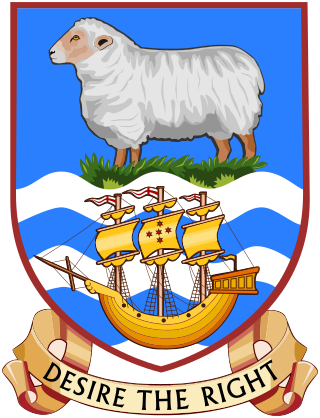
The politics of the Falkland Islands takes place in a framework of a constitutional monarchy and parliamentary representative democratic dependency as set out by the constitution, whereby the Governor exercises the duties of head of state in the absence of the monarch and the Chief Executive is the head of the Civil Service, with an elected Legislative Assembly to propose new laws, national policy, approve finance and hold the executive to account.

A lawyer is a person who practices law. The role of a lawyer varies greatly, across different legal jurisdictions. A lawyer can be classified as an advocate, attorney, barrister, canon lawyer, civil law notary, counsel, solicitor, legal executive, and public servant. — with each role having different functions and privileges. Working as a lawyer generally involves the practical application of abstract legal theories and knowledge to solve specific problems. Some lawyers also work primarily in advancing the interests of the law and legal profession.

A paralegal, also known as a legal assistant, or paralegal specialist is a legal professional who performs tasks that require knowledge of legal concepts but not the full expertise of a lawyer with an admission to practice law. The market for paralegals is broad, including consultancies, companies that have legal departments or that perform legislative and regulatory compliance activities in areas such as environment, labor, intellectual property, zoning, and tax. Legal offices and public bodies also have many paralegals in support activities using other titles outside of the standard titles used in the profession. There is a diverse array of work experiences attainable within the paralegal field, ranging between internship, entry-level, associate, junior, mid-senior, and senior level positions.

A prosecutor is a legal representative of the prosecution in states with either the adversarial system, which is adopted in common law, or inquisitorial system, which is adopted in civil law. The prosecution is the legal party responsible for presenting the case in a criminal trial against the defendant, an individual accused of breaking the law. Typically, the prosecutor represents the state or the government in the case brought against the accused person.
Legal aid is the provision of assistance to people who are unable to afford legal representation and access to the court system. Legal aid is regarded as central in providing access to justice by ensuring equality before the law, the right to counsel and the right to a fair trial. This article describes the development of legal aid and its principles, primarily as known in Europe, the Commonwealth of Nations and in the United States.
A public defender is a lawyer appointed to represent people who otherwise cannot reasonably afford to hire a lawyer to defend themselves in a trial. Several countries provide people with public defenders, including the UK, Belgium, Hungary and Singapore, and some states of Australia. Brazil is the only country in which an office of government-paid lawyers with the specific purpose of providing full legal assistance and representation to the needy free of charge is established in the constitution. The Sixth Amendment to the US Constitution, as interpreted by the Supreme Court, requires the US government to provide legal counsel to indigent defendants in criminal cases. Public defenders in the United States are lawyers employed by or under contract with county, state or federal governments.

The law of the Hong Kong Special Administrative Region has its foundation in the English common law system, inherited from being a former British colony and dependent territory. There are several sources of law, the primary ones being statutes enacted by the Legislative Council of Hong Kong and case law made by decisions of the courts of Hong Kong.
The Legal Services Commission (LSC) was an executive non-departmental public body of the Ministry of Justice which was responsible for the operational administration of legal aid in England and Wales between 2000 and 2013.
The Legal Practice Course (LPC) – also known as the Postgraduate Diploma in Legal Practice – is a postgraduate course and the final educational stage for becoming a solicitor in England, Wales and Australia. The course is designed to provide a bridge between academic study and training in a law firm. It is a one-year, full-time course, and tuition fees range from £8,000-£17,300 a year. A small proportion of students may have their fees and some living expenses paid for by future employers under a training contract.
The Judicial Appointments Commission (JAC) is an independent commission that selects candidates for judicial office in courts and tribunals in England and Wales and for some tribunals whose jurisdiction extends to Scotland or Northern Ireland.
A duty solicitor, duty counsel, or duty lawyer, is a solicitor whose services are available to a person either suspected of, or charged with, a criminal offence free of charge, if that person does not have access to a solicitor of their own and usually if it is judged by a means test that they cannot afford one. The system is operative in several Commonwealth countries, including the United Kingdom, Australia, New Zealand and Canada.
The Solicitors Regulation Authority (SRA) is the regulatory body for solicitors in England and Wales.
Legal Aid BC is the legal aid provider in British Columbia, Canada.

The Courts and Legal Services Act 1990 was an Act of the Parliament of the United Kingdom that reformed the legal profession and courts of England and Wales. The Act was the culmination of a series of reports and reforms that started with the Benson Commission in the 1970s, and significantly changed the way that the legal profession and court system worked.
The Legal profession in England and Wales is divided into two distinct branches under the legal system, those of solicitors and barristers. Other legal professions in England and Wales include acting as a judge, as the Attorney-General, as the Solicitor-General, or as the Director of Public Prosecutions.

The Legal Aid, Sentencing and Punishment of Offenders Act 2012 (LASPO) is a statute of the Parliament of the United Kingdom enacted by the coalition government of 2010-2015, creating reforms to the justice system. The bill for the act was introduced in the House of Commons on 21 June 2011, and received Royal Assent on 1 May 2012.
The British Post Office scandal, sometimes called the Horizon IT scandal, involved the Post Office pursuing thousands of innocent subpostmasters for shortfalls in their accounts, which had been caused not by dishonesty but by faults in Fujitsu Horizon software. Between 1999 and 2015, over 900 subpostmasters were convicted of theft, fraud and false accounting based on faulty Horizon data, with about 700 of these prosecutions carried out by the Post Office. Other subpostmasters were prosecuted but not convicted, forced to cover Horizon shortfalls with their own money, or had their contracts terminated. The court cases, criminal convictions, imprisonments, loss of livelihoods and homes, debts and bankruptcies, took a heavy toll on the victims and their families, leading to stress, illness, family breakdown, and at least four suicides. In January 2024, the scandal was described by the prime minister, Rishi Sunak, as one of the greatest miscarriages of justice in British history.
The Scottish Legal Complaints Commission (SLCC) is a non-departmental public body responsible dealing with unresolved complaints against legal practitioners operating in Scotland. It was established under the Legal Profession and Legal Aid (Scotland) Act 2007 and came into operation on 1 October 2008, replacing the Scottish Legal Services Ombudsman.

Tuckers Solicitors LLC, known as Tuckers Solicitors, is a national criminal defence firm that has particular specialisation in serious crime, extradition, martial and military law, civil liberties, human rights, cyber crime and is one of the largest law firms headquartered in London. The firm featured in series of television shows about crime and disorder on national channels and has appeared on national news, commenting on various legal affairs.

On 14 March 2022, the Criminal Bar Association (CBA) in England and Wales voted to undertake industrial action protesting against stagnant fees with 94% of criminal barristers in favour. The industrial action consisted of refusal to accept returns—substitution of a new barrister, often at the last minute, when another of them is unavailable to make a trial date—in Advocates' Graduated Fee Scheme (AGFS) -funded cases in the Crown Court. The action began on 11 April 2022. Almost 2,500 people are participating in the action. The CBA did not consider the initial action a strike because its members are under no obligation to accept returns, which it calls "a gesture of goodwill to prop up the criminal justice system". Two months later, in June 2022, barristers began an open-ended strike every other week based on a CBA ballot in late May. In October 2022, during the premiership of Liz Truss, barristers voted to end the strike following a deal with then-Secretary of State for Justice, Brandon Lewis.










